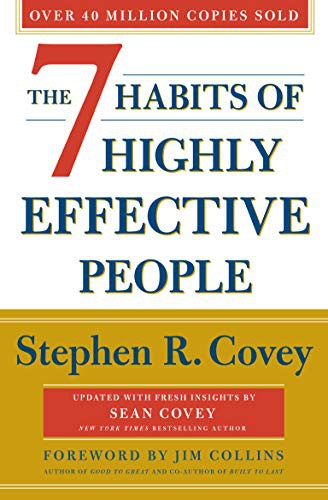Stephen R. Covey’s The 7 Habits of Highly Effective People, published in 1989, isn’t just another self-help book; it’s a paradigm shift, a philosophical guide wrapped in practical advice that continues to resonate decades later. Covey, a respected educator and leadership consultant, doesn’t offer quick fixes. Instead, he presents a principle-centered approach to personal and interpersonal effectiveness. The book’s enduring popularity stems from its focus on character ethic rather than personality ethic, urging readers to build effectiveness from the inside out. The book’s core message is as relevant today as it was when it was first released, urging us to take control of our lives and relationships.
Content Overview:
Covey’s framework centers around seven interconnected habits, split into three stages of growth: independence, interdependence, and continuous improvement. Habit 1, “Be Proactive,” challenges us to take responsibility for our choices, moving beyond reactivity. Habit 2, “Begin with the End in Mind,” emphasizes creating a personal mission statement, acting with a clear vision of our goals and values. Habit 3, “Put First Things First,” guides us to prioritize based on importance rather than urgency, effectively managing our time and energy. These first three habits are all about self-mastery. Check out the book on Amazon
The next three habits focus on interdependence, which is effective relationship building. Habit 4, “Think Win-Win,” promotes mutual benefit in all interactions. Habit 5, “Seek First to Understand, Then to Be Understood,” underscores the importance of empathic listening before speaking. Habit 6, “Synergize,” advocates for creative collaboration to produce better results than individuals could achieve alone. Finally, Habit 7, “Sharpen the Saw,” emphasizes the need for continuous self-renewal in all dimensions of our being—physical, social/emotional, mental, and spiritual. The book’s structure is logical, progressing from personal effectiveness to building strong relationships and improving oneself continuously.
Practical Application:
The strength of The 7 Habits lies in its actionable strategies. Covey doesn’t just present abstract concepts; he provides practical tools and exercises. For example, he introduces the “Time Management Matrix,” a tool to distinguish between urgent and important tasks, helping readers prioritize effectively. The concept of a personal mission statement is a powerful exercise in self-discovery, aligning one’s actions with core values. He includes case studies and examples of individuals who’ve transformed their lives by adopting these principles, adding a relatable touch to the often daunting task of self-improvement. Applying these habits isn’t a quick fix, but a journey towards greater effectiveness and personal satisfaction.
One story that particularly struck me was that of a manager who, by practicing empathic listening (Habit 5), transformed his relationship with his team, creating a more collaborative and productive environment. These principles are applicable in any facet of life, from managing a household to leading a major corporation. The idea of “Win-Win” negotiation (Habit 4) is especially relevant in today’s world, where collaboration and mutual benefit are becoming increasingly important. The book provides a framework that not only boosts efficiency but also enhances overall well-being. Get your copy today
Research & Authority:
Covey’s authority isn’t just anecdotal; it’s grounded in principles of human behavior. He draws on the work of philosophers, psychologists, and leaders to develop his framework. He emphasizes the importance of a “character ethic,” which is about integrity, humility, and fidelity to universal principles, rather than focusing solely on a “personality ethic” of charm and technique. The book is a blend of timeless wisdom and contemporary relevance, supported by years of research and experience. Covey’s deep understanding of human nature, combined with his practical approach, gives the book a sense of credibility and longevity. His focus on principles instead of practices is what sets this book apart from other self-help titles.
Writing Style & Narrative Techniques:
Covey’s writing style is clear, direct, and engaging. He uses simple language to convey complex ideas, making the book accessible to a wide audience. The book’s structure is well organized, with each habit explained thoroughly and supported by practical examples. Covey avoids unnecessary jargon, focusing on clarity and effectiveness. His voice is authoritative yet compassionate, encouraging readers to adopt these principles while acknowledging the challenges involved in personal growth. The book doesn’t feel like a lecture but a conversation, guiding the reader towards self-discovery and improvement. Grab your copy and start your journey
The narrative is interwoven with stories and real-life examples, which make the principles relatable and tangible. Covey uses anecdotes from his own life and experiences to connect with the reader. He encourages reflection and self-assessment, prompting readers to actively engage with the material rather than passively consuming it. The book’s emphasis on character development rather than quick fixes sets it apart from many other self-help titles. Covey’s calm, principled approach makes the journey of self-improvement seem both attainable and profoundly meaningful.
Conclusion:
The 7 Habits of Highly Effective People is more than a self-help book; it’s a transformative guide to living a principled and effective life. It encourages a paradigm shift in how we view ourselves and our relationships with others. The book leaves a lasting impact because it doesn’t offer superficial solutions but instead challenges readers to develop a character ethic rooted in timeless principles. The journey towards effectiveness requires introspection, effort, and a commitment to continuous growth, and Covey’s book provides the tools and framework to embark on that journey. Start your path to effectiveness today!
I recommend this book to anyone seeking meaningful change and growth in their personal and professional lives. Its lessons are relevant for students, professionals, parents, and anyone aiming to live a life of purpose and effectiveness. If you enjoyed this book, you might also appreciate books like How to Win Friends and Influence People by Dale Carnegie, which also focuses on interpersonal effectiveness, or Man’s Search for Meaning by Viktor Frankl, which explores the power of meaning and purpose in life. Covey’s timeless principles continue to inspire, guide, and transform lives, making this book a cornerstone of personal development literature.

